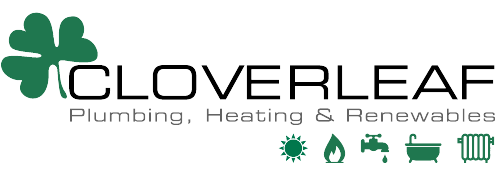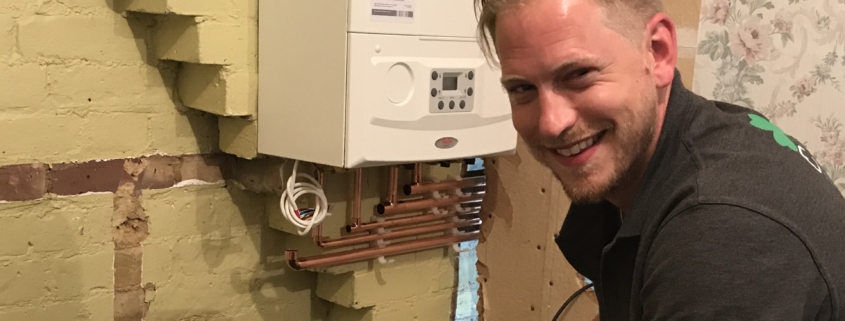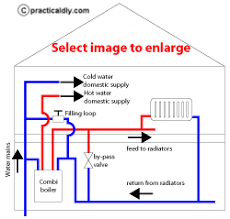Combi Boilers – What are the pros and cons?
Combi Boilers, the pros and cons
This is a question I get asked a lot when helping customers choose the right combi boilers for their property. Hopefully this article will help to make the facts a bit clearer so you can understand the pros and cons of a combi boiler installation before making a decision.
Many people I go and see will say to me right from the off, ‘I would like a combi boiler please’ without really understanding the negative aspects of a combi verses other choices that may be available.
Combi Boilers – The Pros ✔
- A Combi boiler in most cases removes the requirement for a cold water storage tank in the loft. This is because the previously stored cold water services from the tank are converted onto the mains supply dramatically increasing the pressure to taps and showers in the house.
- Removing the water tank also frees up space in the loft for storage or a conversion leaving you with whats called a dry loft. No water services in the loft reduces the risk of water tanks or pipework leaking through the ceiling in future so provides peace of mind!
- As part of a combi boiler conversion the hot water cylinder is also usually removed, freeing up a handy storage space.
- A combi boiler provides hot water on demand, in other words when the hot tap is turned on the boiler will fire and send hot water to the tap. In theory you should only be paying for the hot water you use and need. With a traditional hot water system the boiler heats the cylinder and the stored water sits there until it is drawn off, so there is always the risk of water being heated unnecessarily, if not exhausted before it cools down.
- A combi boiler also increases the hot water pressure to all taps and showers, which once combined with the increased cold water pressure is a big perk of removing your tank fed system. Showers will automatically become power showers, compared to a standard non pumped traditional system and taps miraculously come to life!
- Due to the cold water main now being the primary source to all taps, you can now drink it! Very handy in the night should you wish to grab a drink of water and your bathroom is closer to your bedroom than the kitchen.
Combi Boilers – The Cons ✘
- Combi Boilers can only provide a limited volume of hot water to taps and showers, therefore unsuitable for properties with more than two bathrooms. If a combi boiler for instance, can deliver 18 litres per minute, which is about the maximum performance achievable right now, the 18 litres per minute has to be shared between what ever is being drawn off it. For example, with this boiler you could run two showers, each one achieving 9 litres per minute flow rate. If you were for instance running a bath, all of the performance (18 litres per minute) would be required to run that bath in a sensible amount of time.
- Combi boilers and mains water systems in general are totally reliant on the pressure and flow rate to the house. It needs to be adequate enough to cope with all the cold water and hot water running from the same supply. The classic mistake we see, many plumbers do not check this first and install combination boilers in houses which should never have had the cold water storage tank removed in the first place due to low mains water flow rate. So, if you have 12 litres per minute coming into your property and your combi boiler is sized to heat 12 litres per minute, as soon as someone else turns on another tap in the house or a washing machine, it will starve the combi boiler of water. If this happens and you are in the shower, it will just trickle out for a while or stop completely until full pressure is restored to the shower.Here is the simple test we do on a site survey to check you have adequate flow rate to your house.
- Combi boilers do not have a back up, so in the event that the boiler breaks, in most cases you will lose both heating and hot water until the boiler is repaired.
- Bringing your hot water and heating into one nice neat box does have its downsides. Some clients negate this by also Installing an electric shower which does not need the boiler to provide hot water and will work independently.
- Hot water will take a long time to reach taps or showers when hot water draw offs are a considerable distance away from the combi boiler.
- This can be frustrating and wastes water on a grand scale! TIP-Look at the proposed location for the combi boiler and then the furthest tap away from the boiler location. If for example you are thinking of Installing combi boiler on on the ground floor of a town house and there is a bathroom on the 2nd floor you will experience this problem and worth avoiding . This is the reason why hot water cylinders are usually sited in the central of property to distribute hot water quickly to the taps.
- Combi boilers are much more prone to scaling up as the plate heat exchanger fitted to this type of boiler have very narrow water ways. This can be addressed by fitting water softeners and magnetic system filters on the heating side. A clean combi boiler is a happy boiler!
- Modern combi boilers do not have as long a life span as a traditional system and they can become inefficient to repair near the end of their life. The best advice is to get the longest manufacturers warranty you can at the outset and keep the boiler regularly maintained with an annual boiler service. A good quality combination boiler depending on the amount of use should last 10 to 12 years.
I hope this article has been informative and although this post was not meant as an advert we would of course welcome anybody who is thinking of upgrading their boiler to contact us via the contact page or give us a call on 0800 2851920.
The purpose of this article is to educate and provide honest advice based on the facts and 25 years in the business.
If you feel it has done that please like and share the article below or from our Facebook page.
Thank you, Dean











